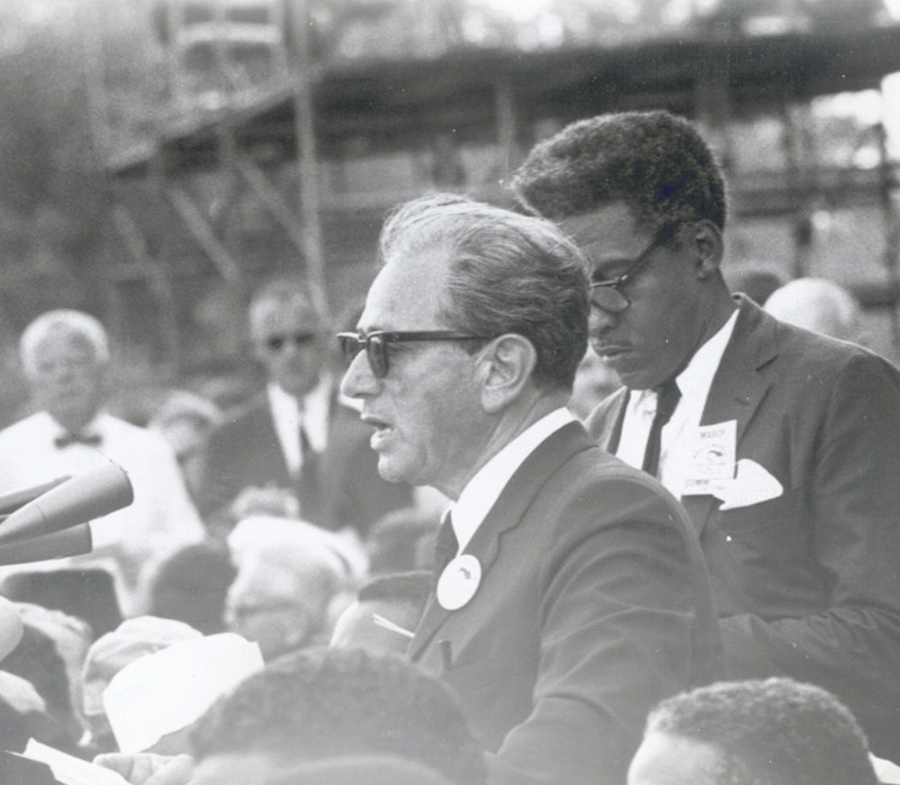Rabbi Turned Voice of Civil Rights Movement
Joachim Prinz, former rabbi in Berlin during the 1930s, was forced to leave Germany for his anti-Nazi sentiments, only to become a close personal friend of Martin Luther King Jr. and a voice of the Civil Rights Movement in the United States. According to Rabbi Dena Brodian, the remarkable Rabbi Prinz had been “all but forgotten” as a voice of the Civil Rights Movement until recently. The 2013 film about his life and accomplishments, “I Shall Not Be Silent,” was shown Wednesday, January 21, in the Africana, Latin American, Asian American and Native American (ALANA)
Cultural Center as a part of MLK week.
At the young age of 24, Joachim Prinz discovered his identity as a Jew and became a Rabbi. Although not considered the most devout of Rabbis, he was the most animated, charismatic and involved in the community. Friends from Berlin described Prinz as a “cultural and religious rock-star” who could be seen going ice-skating with local children on weekends.
Prinz not only preached about the
Jewish faith, but also about the important issues for the Jewish community in 1930s Berlin. From the earliest notice of Adolf Hitler, Prinz warned his congregation of Hitler’s capabilities. Extreme anti-Semitism and segregation soon followed.
Over the course of a few years, the non-Jewish people of Germany, who used to look at and know their Jewish neighbors, instead began to look through Jews, said Prinz. Prinz experienced this, and the resulting dehumanization, personally. He then made it his mission to strengthen the Jewish spiritual resiliency through confidence, self-esteem and sermons full of Jewish pride.
Nazi surveillance of his sermons, coupled with Prinz’s anti-Nazi sentiments, forced Prinz to leave Germany in 1937, and he urged his congregation to do the same. Though Prinz ended up in the United States, he encouraged his fellow Jews to go find safety and freedom in Israel–a Zionist through and through.
Upon his arrival in the US, Prinz hoped for freedom from oppression and to “believe in the statue of liberty,” he said. Prinz soon became disappointed. Segregation, inequality and injustices against blacks in America – much like those against Jews in Germany – prevented Prinz from enjoying the supposed land of the free.
Prinz saw firsthand what happens when people lose their freedom, when injustices “unfold in silence,” and became determined to not let history repeat itself. For Prinz, justice for Jews was inextricably linked to justice for blacks. Thus, he found a “kindred soul” in Martin Luther King Jr.
Prinz and King were similar in their belief in the strength of the human spirit in the face of injustice and in their reliance on the spoken word as a means to ignite a collective passion. Prinz, a gifted orator throughout his entire life, spoke to the largest crowd of his career on August 28, 1963, when he spoke alongside black leaders at the March on Washington.
“I speak to you as an American Jew,” Prinz began, to a crowd of 200,000 people. He spoke out on his own history, having witnessed the inhuman activities that led to on of the largest genocides in history. Despite the horrors that occurred, Prinz called out silence in the face of injustice as the most urgent, shameful, dangerous, and disgraceful issue of the time. Prinz then urged all of America to speak out, “not for the sake of the Negro, but for the sake of the dream of America itself.”
At the heart of Prinz’s address was a sincere intolerance for injustice, as well as a cry for the strength of community. Prinz asked the crowd to cultivate a collective responsibility for the integrity of their neighbors. The fight against injustice and the struggle for community seemed to be the core ideals for which people of different histories could wholeheartedly intersect.
And it is these issues – injustice and the struggle for community – that we, as people of many identities and histories, continue to face today. The story of Joachim Prinz seems to indicate that spiritual resiliency and willingness to take care of one’s own lie at the heart of success.







